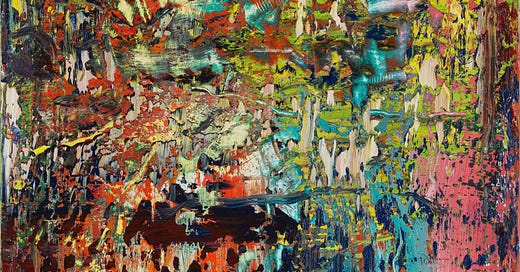David Zwirner
537 West 20th Street, New York
16 March — 22 April
David Zwirner is pleased to announce the gallery’s first exhibition of works by Gerhard Richter since the announcement of his representation in December 2022. On view at 537 West 20th Street in New York, the presentation will feature new and recent abstract works by Richter, all created between 2016 and 2023. Featuring paintings, sculptures, and works on paper, this will be the artist’s first solo exhibition in New York since his retrospective at The Metropolitan Museum of Art, which was only briefly on view in March 2020.
Celebrated worldwide as one of the most important artists of his generation, with a career spanning from the 1960s to the present, Richter has pursued a diverse and influential practice characterized by a decades-long commitment to painting and its formal and conceptual possibilities. The artist has consistently probed the relationship between painting and photography, engaging a variety of styles and innovative techniques in a complex repositioning of genres. In Richter’s work, dual modes of representation and abstraction fundamentally question the way in which we relate to images.
The exhibition will bring together a significant group of Richter’s last oil paintings, made in 2016–2017, a number of which will be shown in New York for the first time. Richter stopped making oil paintings in 2017, and the final work on canvas he made will be on view in the exhibition. Part of the artist’s Abstrakte Bilder (Abstract Paintings) series—a cornerstone of his practice since the 1970s—the works on view exemplify Richter’s investigations into chance occurrences and the painted medium’s historical and material properties. With their highly worked and intricately stratified surfaces, the last paintings foreground the sheer physical presence of paint and color, enacting a mode of composition that is aleatory yet deliberately planned.
Centrally featured will be 3 Scheiben (3 Panes) (2023), a new glass sculpture that continues Richter’s exploration of human perception and the built environment. Comprising three sequential rectangular panes of transparent yet reflective glass—each one positioned upright and measuring almost ten feet in height—the installation invites viewers to look at, through, and beyond its surface, revealing the inherently subjective and situational nature of perceived reality. Richter has consistently created glass and mirrored works since 1967, often presenting them alongside his paintings and drawings and placing them in the larger context of their surrounding architecture. Crucially, while sculptural, these free-standing glass works are also positioned as a literal reflection on painting and image-making; they respond to the art-historical notion of the painting as both a mirror and a window, while also acting as a powerful corollary to the blurred effect of Richter’s photo paintings, which the artist began experimenting with in the 1960s. As critic Hal Foster notes, “The felt analogy between a composed painting and a contemplative viewer is so fundamental that we are not aware of it until it is interfered with. And this is precisely what the glass pieces do: our reflection, in the sense of our mirrored image, disrupts our reflection, in the sense of our contemplation.”1
An expansive suite of new works on paper from 2021–2022—some made with ink and others with graphite and colored pencil—will also be on view. Richter’s drawings constitute a significant element of his practice, allowing him to explore another aspect of the role of the artist’s hand in the creation of a dynamic and abstract pictorial narrative. Many of these works feature passages of cloudy graphite rubbings juxtaposed with equally hazy semi-erased portions. The artist embeds a sparse network of crisscrossing arcs and lines amongst this backdrop, forming an enigmatic topography that seems to map out the very possibilities of image-making itself. Other drawings on view are composed of abstract monochrome washes of ink and graphite, taking on a decisively painterly appearance; as Richter describes, these works on paper chart out a parallel but complementary path to his painted oeuvre, much like that of “a poem and a novel by the same author.”2
Also on view will be mood, a group of inkjet prints that relate to a recent series of colored ink drawings by Richter, both of which debuted at the Fondation Beyeler in Basel in 2022. Part of the artist’s extensive career-long experiments with the iterative translation and interplay of mediums, these vibrant prints are almost indistinguishable from their ink counterparts, revealing Richter’s continued fascination with the possibilities of image reproduction.
On the occasion of his exhibition at David Zwirner, Richter will publish a new, limited-run artist’s book titled 100 Abstract Pictures. This presentation will additionally be accompanied by a fully illustrated catalogue forthcoming from David Zwirner Books with a newly commissioned essay by Dieter Schwarz. One of the foremost experts on Richter’s work, Schwarz is an art historian, writer, curator, and former director of the Kunstmuseum Winterthur, Switzerland.
Concurrently on view at the Neue Nationalgalerie in Berlin will be Gerhard Richter: 100 Works for Berlin. Opening in April 2023, this special long-term presentation will feature works that the Gerhard Richter Foundation gave to the museum on permanent loan in 2021, including Richter’s Birkenau (2014) cycle of large-scale abstract paintings.
Hal Foster, “In a Glass, Darkly,” in Gerhard Richter: Painting After All. Exh. cat. (New York: The Metropolitan Museum of Art, 2020), p. 96.
Gerhard Richter, as quoted in Dieter Schwarz, “Gerhard Richter: Drawings 1963–2020,” in Gerhard Richter: Drawings 1963–2020. Exh. cat. (Düsseldorf: Sies + Höke, 2022), p. 16.
in case you’ve missed…




